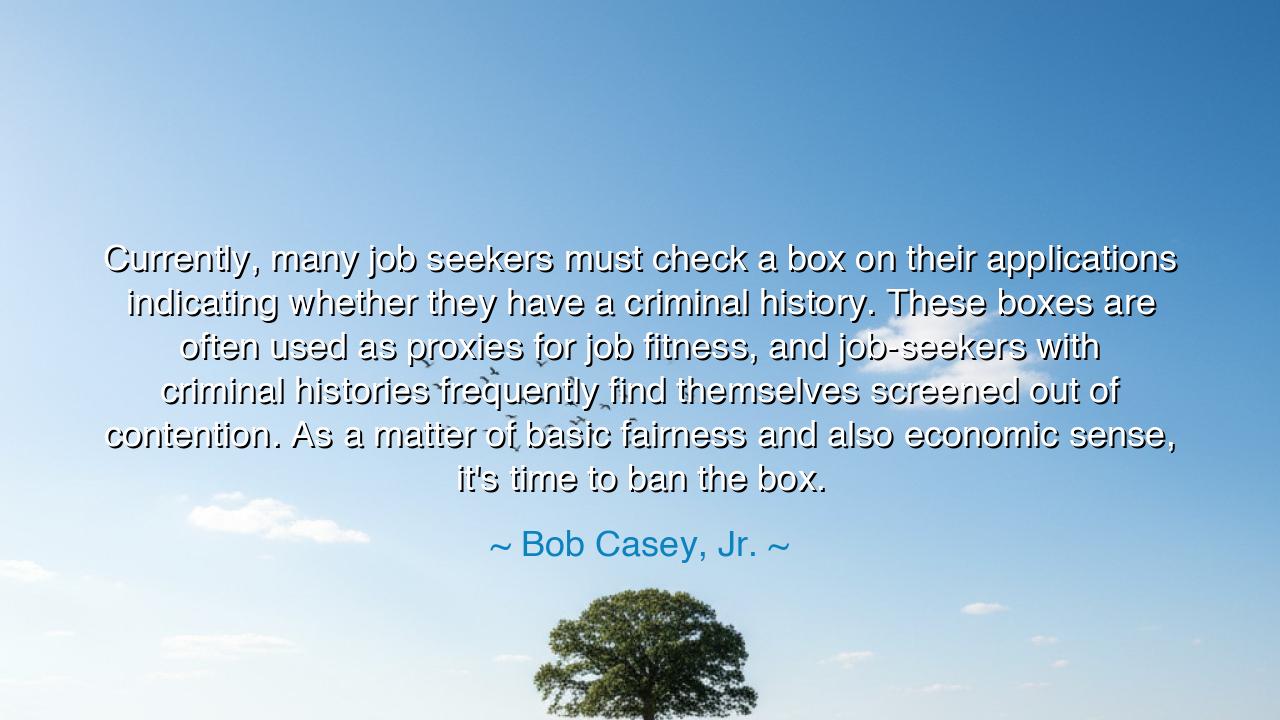
Currently, many job seekers must check a box on their
Currently, many job seekers must check a box on their applications indicating whether they have a criminal history. These boxes are often used as proxies for job fitness, and job-seekers with criminal histories frequently find themselves screened out of contention. As a matter of basic fairness and also economic sense, it's time to ban the box.






Host: The room was quiet, the soft glow of the lamp casting a warm light across the table. Outside, the world had quieted, and the peaceful rhythm of the evening filled the air. Jeeny sat at the table, her fingers gently tracing the rim of her cup, reflecting on the words she had just read. Jack, standing near the window, gazed out into the darkened world, his mind clearly absorbed in thought. The atmosphere between them was calm, but there was an unspoken understanding that their conversation was about to unfold into something more complex.
Jeeny: (breaking the silence, her voice calm but thoughtful) “I came across something by Bob Casey, Jr. today that really struck me. He said, ‘Currently, many job seekers must check a box on their applications indicating whether they have a criminal history. These boxes are often used as proxies for job fitness, and job-seekers with criminal histories frequently find themselves screened out of contention. As a matter of basic fairness and also economic sense, it’s time to ban the box.’ What do you think about that?”
Jack: (pauses, his voice thoughtful) “It’s a powerful statement, isn’t it? Casey is pointing out how biases are built into systems that should be about fairness and opportunity. The practice of requiring job seekers to check a box about their criminal history, while perhaps meant to be a filter for screening applicants, often acts as a barrier to employment for many people who are trying to reintegrate into society after making mistakes. It’s not just about justice; it’s about economic sense. When you block people from opportunities based on their past, you’re not just hurting them—you’re hurting the economy too by keeping a significant portion of the population from contributing.”
Jeeny: (nodding slowly) “Exactly. Casey is recognizing that second chances are crucial, both for individuals and for society. People who have served their time and paid their dues shouldn’t have to face lifelong consequences when they’re trying to turn their lives around. The ‘check the box’ question is just one more way that structural inequality is reinforced. By using that box as a filter, we’re excluding a large group of people who could potentially be valuable, skilled workers but are automatically rejected based on their criminal past.”
Host: The stillness in the room deepened as the conversation continued. Jack turned slightly toward Jeeny, his expression softening as he considered the broader implications of Casey’s words. Outside, the world had quieted, but inside, their conversation had turned inward, reflecting on the unintended consequences of such policies and the need for equity in employment.
Jack: (his voice quieter now, more introspective) “What strikes me is how this policy makes assumptions about people’s worth and potential. It assumes that a criminal history defines a person’s fitness for a job, which is simply untrue. Many people who have criminal histories have learned from their mistakes and have a lot to offer, but they’re continually penalized by a question that doesn’t speak to their current capabilities or potential. It’s a narrow view of someone’s character and abilities.”
Jeeny: (softly) “Yes, and it also ignores the larger context. Not everyone with a criminal history is the same. People come from different circumstances, and a single mistake shouldn’t define their future opportunities. Casey’s suggestion to ‘ban the box’ is about providing equity—offering a fair shot to those who might otherwise be shut out. It’s not about ignoring someone’s past; it’s about recognizing their potential to change and contribute to society moving forward.”
Jack: (nodding slowly) “Exactly. And it speaks to the idea of fairness. Just because someone has a criminal history doesn’t mean they’re unfit for a job or for society. We need to look at people holistically—what they’ve learned, how they’ve grown, and what they can bring to the table, rather than just judging them by their past mistakes.”
Jeeny: (smiling gently) “Yes. It’s about offering people the opportunity to move forward. By banning the box, we open up a whole new range of possibilities for people who are genuinely trying to make a fresh start. It’s about giving them the tools and the chance to contribute to the world, to society, and to their own future.”
Host: The quiet between them grew deeper now, as the conversation continued. Outside, the world had quieted, but inside, the room was filled with a shared understanding about fairness, second chances, and equity in the world of employment. Jeeny and Jack had uncovered a deeper truth in Casey’s words—that removing the box from job applications would allow for fairer opportunities for people with criminal histories, helping them reintegrate and contribute to society rather than keeping them locked out.
Jack: (smiling softly, his voice more assured) “It’s a reminder that we need to open doors for people, not keep them closed because of past mistakes. Fairness in employment isn’t just about qualifications; it’s about giving people a chance to prove themselves.”
Jeeny: (nodding warmly) “Exactly. It’s about recognizing potential and seeing people for who they are now, not just what their past says about them.”
Host: The world outside had quieted to a peaceful stillness, but inside, the room was filled with understanding. Jeeny and Jack had uncovered the deeper meaning in Casey’s words—that second chances in employment are essential for fairness and economic growth. The night continued outside, but inside, the room felt full of the realization that offering opportunities to people with criminal histories benefits not only individuals but society as a whole.






AAdministratorAdministrator
Welcome, honored guests. Please leave a comment, we will respond soon